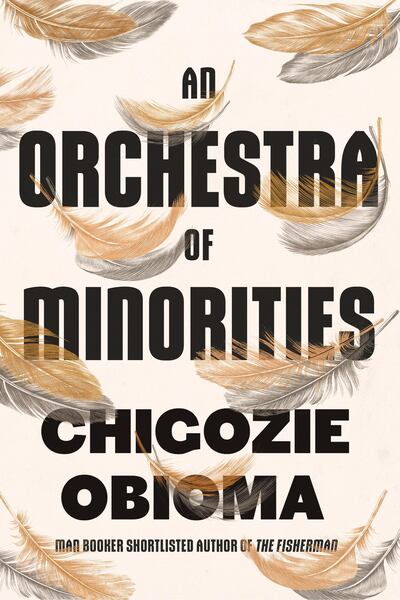Chigozie Obioma's 2015 debut novel The Fishermen played out in the author's native Nigeria and followed four young brothers whose lives are turned around after hearing a local madman's dark prophesy. Expertly layered and imbued with mystery and suspense, this tale of unravelling family bonds made the Man Booker Prize shortlist and heralded the arrival of an important new voice in world literature.
And yet, for all its strengths, the novel felt either underdone or overcooked in places. Praise from some quarters bordered on hyperbolic: the book was compared to a miniature masterpiece by Gabriel Garcia Marquez; Obioma, who wasn’t yet 30 years old, was hailed as the successor to Chinua Achebe. There was undeniable talent on show; what was debatable was whether it was quite so fully fledged.
'An Orchestra of Minorities'
Four years later and Obioma has returned with a second novel to cement his reputation. An Orchestra of Minorities is grander in scope than its predecessor – at the outset forbiddingly so. Before reaching chapter one the reader is confronted first with charts, diagrams and classifications relating to Igbo cosmology, and then by a lengthy incantation to Chukwu, the high god and creator of all in the Igbo religion.
It is likely to appear daunting for the uninitiated and exasperating for the impatient. But perseverance pays off. Once the novel gets under way, we find ourselves immersed in a captivating drama about one man’s quest to defy the odds, overcome numerous hardships and win back the woman of his dreams.
A captivating story
Obioma’s protagonist is Chinonso, a lowly poultry farmer in Umuahia, Nigeria. However, his narrator is Chinonso’s chi, or guardian spirit, who inhabits his host to protect him from evil ghosts and other “vagabond discarnate creatures”, and prevent rash impulses and hasty judgements.
Chinonso spends his days mourning his father and tending his flock. One day he encounters a woman about to jump to her death from a highway bridge. He talks her round by throwing two of his beloved birds into the water below to emphasise the sheer drop, and leaves the scene with an overdue sense of fulfilment.
When the pair meet again some months later they form a bond then fall in love. This “man of much sorrow” is transformed by new sweetheart Ndali into a man with a purpose. But problems soon materialise. Ndali comes from a wealthy family and is training to be a pharmacist, and her father, a titled chief, together with her bully-boy brother, make it painfully clear to poor, uneducated Chinonso that he is an unworthy suitor.
Realising that the only way to be accepted is to finish his education, Chinonso follows a friend’s advice and sells his house, his compound and his poultry to pay for a university course in Cyprus. However, he quickly learns to his cost that his friend is not as well-meaning as he claimed to be and Cyprus is not the land of opportunity that he was told it was.
Conned, penniless and dispirited, “a person who – like a fowl – had been deplumed and was now bare before the world”, Chinonso finds himself rudderless and relying on the kindness of strangers. The last dregs of his luck run out when he is wrongfully accused of a violent crime and is sent to prison for four years. After his release he is broken, both physically and mentally, and yet is kept going by frantic determination to return home to seek revenge on his false friend and reclaim his lost love. But is he too angry to accomplish one and too late to achieve the other?
__________________
Read more:
The Dubai group that's on a mission to make reading 'cool' again
Newly translated book offers child's perspective on cruelty and war
Absorbing account of Afghan history can stand test of time
__________________
An embattled underdog
Obioma’s cryptic title refers to Chinonso’s defenceless domestic birds – “the weakest among all creatures” – that depend upon him for everything. But Chinonso proves to be just as fragile: a hapless victim and an embattled underdog – “one whom life has dealt a heavy hand.”
Like The Fishermen, this novel employs allegory to good effect, with Obioma subtly, not showily, inviting comparisons and making echoes. Fiction may not need another modern take on Homer's Odyssey but it is still fun to trace the parallels and see how Obioma restyles the homeward-bound epic hero and remodels his loyal, long-suffering wife.
Obioma’s modern myth is made more authentic by the author once again blending in African folklore, fables and proverbs and articulating a range of voices, whether Igbo, Yoruba or pidgin. Admittedly, some speech is hard to decode (“Oh, boy, you no sabi wetin you dey talk”) but the reader is happy to surrender to the choppy rhythms and musical vernacular.
The narrator is the star
It isn’t often that a novel’s narrator overshadows its main character, and yet that is precisely the case here. A brilliant conceit, Chinonso’s blithe spirit works regular wonders: illuminating Igbo mythology, enchanting us with detours to heavenly realms, and entrancing us with a gripping account of its host’s travels and travails.
Occasionally its descriptions are too ornate for their own good. Time passes thus: “the cosmic spider of Eluigwe spins its lush web over the moon the thirteenth time”. Less obscure and far more beautiful are certain observations: “I could see in my host the beginning of the growth of that great seed that bears strong root downward in the soul of a man and bears fruit upwards – the fruit of affection that becomes love”.
An Orchestra of Minorities is a stunning novel which succeeds on so many levels. This time around Obioma deserves every accolade that comes his way.


